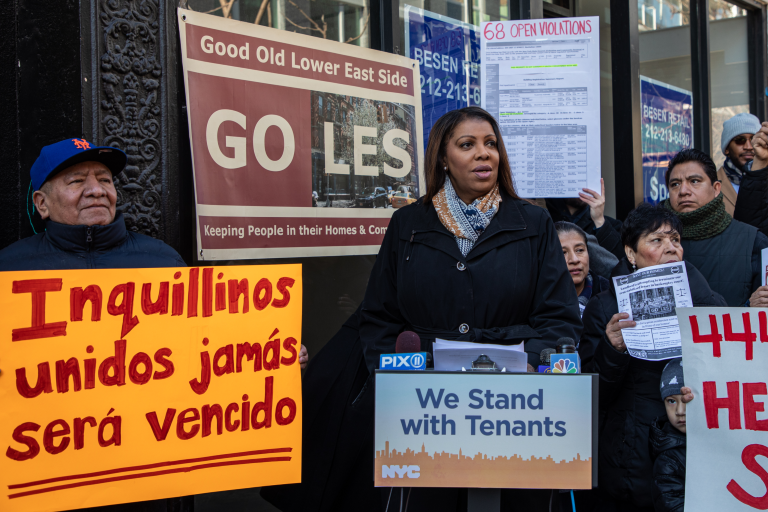Charities Bureau
The Charities Bureau is responsible for supervising charitable organizations to protect donors and beneficiaries of those charities from unscrupulous practices in the solicitation and management of charitable assets.
Charities Bureau work
Civil Rights Bureau
The Civil Rights Bureau works to promote equal justice under law and seeks to enforce the civil rights of all New Yorkers. The bureau enforces laws that protect all New Yorkers from discrimination on the basis of race, color, national origin, sex, religion, age, marital status, sexual orientation, gender identity, military status, source of income, or disability.
Civil Rights Bureau work
Hate Crimes Section
The Hate Crimes Section works with the Civil Rights Bureau to investigate bias-based acts of violence or intimidation. The section can bring civil actions when someone has harmed another person or violated their civil rights because of their race, color, national origin, sex, religion, age, marital status, sexual orientation, gender identity, military status, source of income, or disability.
Voting Rights Section
The Voting Rights Section works within the Civil Rights Bureau to promote and protect the rights of all eligible New Yorkers to vote. The section investigates and addresses voting rights violations, enforces the John R. Lewis New York Voting Rights Act, and ensures that all New York elections are run fairly and free from discrimination.
Environmental Protection Bureau
The Environmental Protection Bureau plays a central role in protecting New York's environment and public health. With a staff that includes some 40 lawyers and 10 scientists, the bureau vigorously enforces both the state's and the nation's environmental laws. It also represents the State of New York in legal matters related to the environment.
Environmental Protection Bureau work
Health Care Bureau
The Health Care Bureau assists patients who have problems accessing health care or getting insurance coverage. We investigate businesses that may be operating illegally. If we find that a business is violating the law, we get remedies for New Yorkers, including refunds and changes in behavior. Our Health Care Helpline, which handles over 4,000 requests for assistance each year, helps patients obtain coverage and resolve their problems with insurance companies and health care providers.
Health Care Bureau work
Housing Protection Unit
The Housing Protection Unit investigates landlords, brokers, real estate agents, and others for violations of federal, state, and local law regarding housing. The unit brings enforcement actions to protect tenants and ensure safe housing throughout the state.
Housing Protection Unit work
Labor Bureau
The Labor Bureau is nationally recognized for its work defending labor standards in low-wage industries by aggressively enforcing worker-protection laws.
Labor Bureau work
Law Enforcement Misconduct Investigative Office (LEMIO)
The Law Enforcement Misconduct Investigative Office (LEMIO) protects New Yorkers’ safety and civil rights by investigating misconduct and promoting accountability of law enforcement professionals. LEMIO has jurisdiction over New York’s more than 500 local law enforcement agencies. LEMIO investigates alleged wrongdoing, examines departmental policies and procedures, makes recommendations for reform, and publicly reports its findings.
Law Enforcement Misconduct Investigative Office work
Real Estate Finance Bureau
The Attorney General is responsible for the regulation of public offerings of real estate securities in or from New York pursuant to Article 23-A of the New York General Business Law. This includes the regulation of the offer of syndications and cooperative interests in realty, such as cooperatives, condominiums, timeshares, homeowners associations, and senior living communities. The Attorney General also regulates the conversion of rental buildings to condominiums and cooperatives and the initial offer of certain affordable housing developments. The Attorney General also ensures that all broker-dealers of real estate securities register with the Attorney General.
The Attorney General's real estate regulation function is primarily handled by the Real Estate Finance Bureau. For more information about the Attorney General’s regulation of real estate securities along with related topics and resources, please visit the Real Estate Regulation webpage.
The Real Estate Finance Bureau is divided into four sections: Review, Enforcement, Records Management, and Public Information.
The Review Section reviews the following types of filings:
- offering plans
- amendments to offering plans
- amended and restated offering plans
- amendments to amended and restated offering plans
- no-action letters
- amended no-action letters
- cooperative policy statements
- amendments or extensions to cooperative policy statements
- cooperative information packages
- real estate syndication filings
- policy statements (real estate syndication exemption applications)
- form 99
- intrastate filings
The Enforcement Section:
- Enforces the Martin Act both through investigating complaints from the public and developing affirmative initiatives with other bureaus and government agencies on issues such as the preservation of affordable housing and abuse of tax benefits.
- When warranted, may also refer matters to the Criminal Division on Martin Act violations that rise to the level of criminality.
The Records Management Section:
- Processes all broker-dealer registration statements and real estate securities submissions, which will be reviewed by the Review section.
The Public information Section:
- Processes freedom of information requests and makes productions pursuant to these requests.
- Provides information to the public, such as consumer guides, copies of policies, and regulations and statutes, and answers general informational calls from the public.

